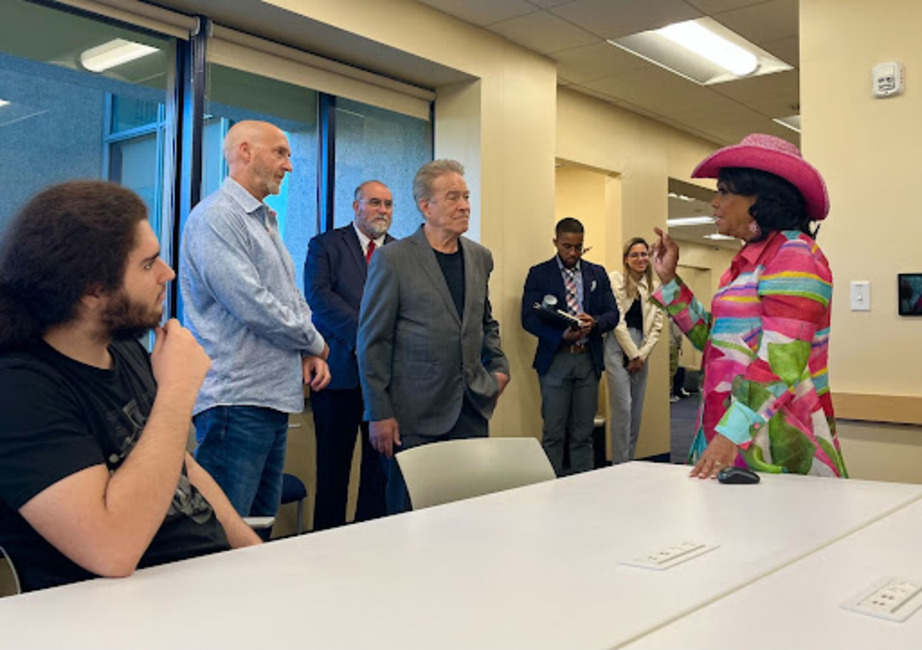Teaching alone has never been enough to live on for Ana Soler, 55. The single mother takes on five supplemental positions at Riviera Middle School in North Kendall, along with her full-time teaching role, to pay for her home and daughter in college.
Soler serves as team leader and activities director and teaches Saturdays, summer school and five language arts classes. She even rents out an efficiency to help make ends meet.
“Are we masochists? Maybe,” said Soler, who declined to disclose her salary. “It can be very stressful, but it’s about security. You really need these things to fall back on.”
A bill in Congress, the American Teacher Act (H.R.9566), would increase teachers’ minimum pay to $60,000 nationwide. Florida’s current teachers’ base is about $48,000; the number varies from state to state.
The bill, proposed by Florida Rep. Fredrica Wilson (D-Miami-Dade) in December 2022, would allow states to apply for federal grants, administered by the Department of Education, to raise both incoming and current teachers’ base salaries. If passed, it would take effect next year.
The legislation does not require all states to meet this minimum, but rather, sets a standard for what teachers should receive, Wilson said during a recent visit to Florida International University.
“To me, $60,000 is like the floor,” Wilson said.
Under the bill, priority for the grants is reserved for areas with higher rates of low-income families.
Bruce Baker, a University of Miami professor and researcher of finance and policy in public education, said pay-raising targeting grants for low-come schools could help attract teachers to work in those places that are most in need of assistance.
“You can end up having quality teachers, academic backgrounds, and strengths in high-poverty schools,” Baker said.
Randi Weingarten, president of the American Federation of Teachers – the second largest teacher’s union in the country – called Wilson’s bill “absolutely necessary.”
“It is time to stop relying on a teacher’s goodwill,” Weingarten said in an email. “They need to feed their families and have a living wage.”
The fate of the Democratic lawmaker’s proposal in the GOP-controlled House is uncertain. No Republicans have signed onto Wilson’s bill, although the issue of raising teachers’ pay has won bipartisan support across the country.
In February, Florida Gov. Ron DeSantis introduced the Framework for Freedom Budget, which would allocate $200 million to teachers across the state.
Arkansas Gov. Sarah Huckabee Sanders, a Republican, has proposed increasing teacher’s salaries to at least $50,000 and offering bonuses while limiting discourse on race and gender identity. Teacher pay hikes have been proposed by Democrats and Republicans, in other states including Delaware, Mississippi, New Mexico and Tennessee also proposed bills to raise teachers’ pay within the past year.
In the Senate, Bernie Sanders (I-Vermont) plans to propose a salary boost, which Wilson’s press secretary, Karol Molinares, said the congresswoman was “happy to have a prominent voice in the Senate, and an advocate for educators echoing the importance of teacher raises.”

Jennifer Fernandez, civics teacher at Riviera Middle School, said it would be difficult to attract teachers with a pay raise alone. School resources, such as new textbooks and overhead lighting, should also be taken into account, she added.
“It’s so dark and gloomy here. And these books? They’re very old and very haggardly,” Fernandez said. “It can be hard to keep [students] focused with these kinds of distractions.”
Fernandez, who earns $72,000 annually, including supplements from other positions, estimated that the proposed $60,000 base could boost her annual income to about $80,000.
“Teaching is a career where you’re college educated. You could probably be a bartender with a teacher’s current starting base,” Fernandez said. “So I think $60,000 would be a significant amount.”
A decline in the number of teachers has increased some class sizes to over 30, which makes it difficult to individualize each student’s learning experience, Fernandez added.
“I’ve actually calculated it, and I legit would not survive, in terms of pay, if I didn’t have my husband [a firefighter] that fortunately helps out,” Fernandez said. “I go to these meetings, then when I come back to the classroom I just feel like a failure sometimes.”
Baker, the University of Miami professor, said the teacher deficit may deter some states from applying for the grant until more funding is provided to hire additional school staff – including teacher assistants, tutors, aftercare counselors, guidance counselors, and special education personnel.
“The federal government could step up its contribution to schools, but it’s also got to have a way to incentivize states to apply,” Baker said. “It’s one of those things that kind of sells well and sounds good…but it really depends on the adequacy of funding for schools.”

Another teacher, Miriam Barrios of Mater Academy of International Studies, said she believes it is unfair for teachers with greater experience to be offered the same base pay as those who’ve just entered the profession.
“It’s like a knife in the gut because my experience compounds to nothing,” Barrios, who did not disclose her salary, said. “It’s like you’ll be fresh out of college with zero time in the classroom, but you’re getting paid more than the old dog who has been in it for 20 years.”
She said any work-life balance can be difficult for teachers to achieve, given the need for grading and planning, in and outside of the classroom, which can lead to six-day work weeks.
Years ago, her then eight-year-old son learned free time with mom was impossible.
“I’d take home my bag full of papers, laid out on the coffee table, and my older son laughed when my little one asked me to take him to the park,” Barrios said. “It’s the reality of his life. For what we make, it’s hard not to drown in it.”
































